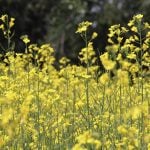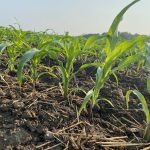Soybeans versus canola | Patent expiries have caused confusion in the past, particularly for the Saskatchewan Canola Development Commission
Roundup Ready canola and soybeans were commercialized at the same time in Canada, but there is an 11 year difference in the dates when their patents expire.
Both products were introduced in 1996. The patent on Roundup Ready soybeans expired in 2011 while the one on Roundup Ready canola doesn’t run out until 2022.
Monsanto Canada spokesperson Trish Jordan said the difference stems from when the last patent was filed for the crops.
In the case of Roundup Ready canola, the last patent was filed by Calgene Inc., a company owned by Monsanto, on May 28, 1987.
Read Also

European wheat production makes big recovery
EU crop prospects are vastly improved, which could mean fewer canola and durum imports from Canada.
Patents filed before Oct. 1, 1989, fall under the old patent act, which gives companies 17 years of protection from the date the patent was finally approved.
In the case of the patent that was filed in 1987, final approval came April 26, 2005, which means the patent expires April 26, 2022.
The new patent act provides 20 years of exclusivity from the date of application. If that act had been in effect when Calgene filed its application, Monsanto’s canola patent would have expired May 28, 2007.
The different rules in the two patent acts caused confusion with the Sask-atchewan Canola Development Commission.
SaskCanola commissioned a study in 2007 to assess the benefit to growers of the removal of a patent it thought would be expiring no later than 2012.
Growers were looking forward to the anticipated savings from reduced technology use agreement fees and from competition from low-cost generic alternatives.
The study showed the annual benefit would range from $56 million to $205 million. The commission was frustrated to learn those savings wouldn’t happen until after 2022.
Meanwhile, soybean growers are now able to use Monsanto’s original herbicide tolerant trait without paying for it.
Even though the Roundup Ready soybean patent expired in 2011 in Canada, this is the first year growers could legally plant farm-saved seed of Monsanto’s soybeans due to obligations under the company’s technology stewardship agreement.
Roundup Ready soybeans are not hybrids, so growers can plant the crop without having to worry about a huge yield drop.
However, Jordan isn’t too concerned about competition from farm saved seed because growers have embraced the company’s second generation of herbicide tolerant soybeans.
“A large chunk of the market has transitioned to Genuity Roundup Ready 2 Yield and that happened pretty quickly,” she said.
The crop accounted for 70 percent of Canadian soybean acres in 2012, which is a bigger market share than the original trait delivered.
“We certainly think it will be higher in 2013,” said Jordan.
Evaluation trial data last year from the Manitoba Pulse Growers Association shows that the second generation Roundup Ready soybeans delivered yields of 103.8 percent of the check variety compared to 94.3 percent for the first generation Roundup Ready soybeans, for a total yield advantage of nearly 10 percent.
Jordan said research also shows that Genuity soybeans treated with Cruiser Maxx provide a 1.9 bushel per acre yield advantage over untreated soybeans. Cruiser Maxx is only available on certified seed.
The company’s second generation of Roundup Ready canola received Canadian regulatory approval last June. Monsanto hopes to commercialize its TruFlex Roundup Ready canola in 2014.
“Growers will likely transition over time to our next generation canola trait,” said Jordan.
There may even be a third generation trait on the market before the Roundup Ready canola patent ex-pires in 2022.
















